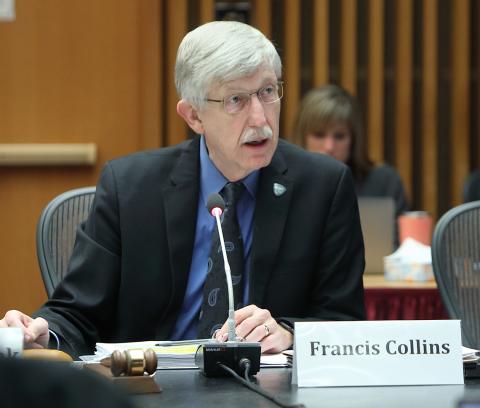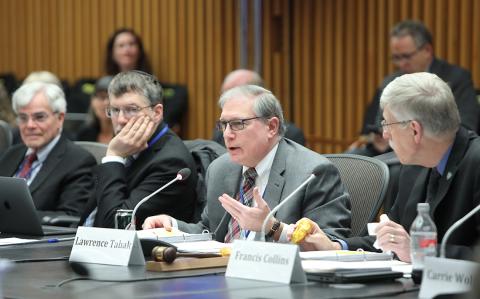117th ACD Considers Wide Range of ‘Thorny Topics’

Photo: Chia-Chi Charlie Chang
If the 117th meeting of the advisory committee to the NIH director (ACD) featured a theme, then it reinforced the core quest of the agency: What concrete actions can NIH take to promote biomedical research and how to protect that effort at home and abroad from threats, now and decades into the future? If those queries seem broad, complex and wide-ranging, then they precisely describe the ACD deliberations on Dec. 13 and 14.
“It’s been an intense 6 months since we last met,” said NIH director Dr. Francis Collins, in opening remarks. “Many of the major issues that we’ve been wrestling with are going to be discussed in the course of this meeting…I can’t recall an ACD meeting that had as many really important thorny topics, all on the agenda in a day and a half.”
More than a dozen items crammed the docket, not counting the traditional briefing Collins provided to begin the meeting that included several topics from the headlines as well as overviews of NIH’s current and potential outlook regarding budget and legislation, in light of last fall’s election.
Leading off the first day were discussions on shielding research from undue influences by both international and domestic entities. The ACD heard a report from its working group on foreign influence on research integrity. Next they considered the follow-up steps NIH enacted in the wake of ending the Moderate Alcohol and Cardiovascular Health (MACH) trial after discovering improprieties in study design and implementation.
ACD member and working group cochair Dr. M. Roy Wilson walked the assembly through the former topic, outlining the scope of a problem that involves intramural as well as extramural intellectual property potentially targeted for misappropriation by organizations outside the United States. Failure of visiting scientists to report financial conflicts and establishing so-called “shadow labs” that illegally copy U.S. resources are just two types of undue influence that have been documented by recent federal investigations.

Photo: Chia-Chi Charlie Chang
After taking a look at his own institution (Wayne State University), Wilson said he found warning flags of a similar threat within the research community there. He cautioned ACD members and NIH leaders to be vigilant about protecting the scientific enterprise from those who would take advantage of its culture of open information-sharing for their own personal gain.
“The main message is that it’s real,” Wilson said. “There are significant breaches that are occurring at our universities…At the same time, when you look at the large number of investigators that are funded by the U.S. government in one way or another, [the problems account for] a relatively small amount. However it’s enough that it’s just not a random occurrence here and there. It seems to be more systematic and in some cases concentrated at certain institutions. It certainly warrants concern and a response.”
Commenting on the challenges this sensitive topic raises, Collins emphasized, “The vast majority of foreign nationals make incredibly important contributions to American science and very few of those individuals have violated NIH systems and processes. As we talk about potential solutions for the instances that have not gone the way they should have, let’s also be sure that we’re moving to protect the incredible value we have in access to talent from all over the world.”
On lessons learned and new standards NIH adopted following the MACH trial shutdown, NIH principal deputy director Dr. Lawrence Tabak talked about the NIH-wide systematic review underway of collaborations with private industry and non-profit organizations. He reiterated the need for a hyper awareness of possible conflicts—and even perception of such—involving potential funding partners. Both overt and negligent harm can occur in research collaborations, and both can tarnish an institution’s reputation and public trust, he said.
“No matter how seemingly small [in terms of dollars] the partnerships are, the reputational risk [of deliberate or unintentional missteps] is really costly,” Tabak said. “By insisting on public transparency, by insisting on disclosure early and often and by insisting that institute and center directors take personal responsibility for these things, I think we could have prevented what we experienced [with MACH].”
In the afternoon session, the ACD heard updates on NIH efforts to accelerate research to stem the nation’s opioid crisis and recommendations from the NextGen working group on ways to grow science as a career by encouraging early-stage investigators.

Photo: Chia-Chi Charlie Chang
“From a philosophical point, the emphasis now is pivoting from the research project or scientific outcome to the person,” said ACD member and NextGen working group cochair Dr. Jose Florez of Massachusetts General Hospital. “We’re emphasizing a person-based view, that we really care about what happens to that person so that the workforce is sustained long-term…It’s a bet not only on a specific body of science—which is important—but also it’s a bet on somebody who’s going to produce not just within that one body of science but also within a career, in a lifetime of many more bodies of science.”
NIH recently updated its policies to address and prevent sexual harassment and to change the culture of science to maximize talent. Tabak, NIH chief officer for scientific workforce diversity Dr. Hannah Valantine and NIH associate director for science policy Dr. Carrie Wolinetz gave insight into understanding the current climate at NIH and opportunities to eliminate any vestiges of harassment going forward.
The final topic of the day continued in the vein of promoting science with a report from the high-risk, high-reward ACD working group.
On day 2, the ACD discussed establishment of an artificial intelligence working group, a report on INCLUDE (INvestigation of Co-occurring conditions across the Lifespan to Understand Down syndrome) and the current status of the BRAIN Initiative, which is already deep into its next phase, dubbed “BRAIN 2.0.”
“Overall, when we looked at what has happened with the BRAIN Initiative from 2014 to 2018, we were extremely impressed,” said Dr. Catherine Dulac of Harvard University. She cochairs the multidisciplinary working group for BRAIN 2.0 that comprehensively assessed progress so far on the ambitious project. “We’re extremely impressed by how faithful, well-crafted and strategic the execution was in terms of the original vision…in an extremely short timeframe. As a result we think the current state of the initiative has not only fulfilled the initial 5-year plan but also in many cases actually surpassed expectations.”
View both days’ deliberations online at https://videocast.nih.gov/summary.asp?Live=29075&bhcp=1 and https://videocast.nih.gov/summary.asp?Live=29079&bhcp=1. Reports and other meeting documents are posted at https://acd.od.nih.gov/meetings.html. The ACD meets next in June.
